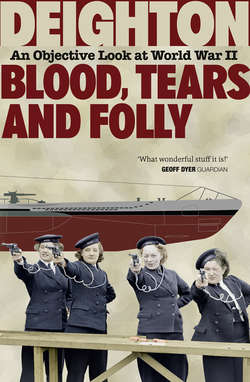Читать книгу Blood, Tears and Folly: An Objective Look at World War II - Len Deighton - Страница 36
6 GERMANY: UNRECOGNIZED POWER
ОглавлениеI have to report that M. Blériot, with his monoplane, crossed the Channel from Calais this morning. I issued to him a Quarantine Certificate, thereby treating it as a yacht and the aviator as Master and owner.
The Collector of Customs at Dover, 25 July 19091
To understand why an improvised and inadequate mixture of British military formations were sent to war in 1939 it is necessary to remember that her army had always been quite different in tradition, formation and function to any of the continental armies.
In the late sixteenth and seventeenth centuries, standing armies were established on the Continent, not so much in response to foreign wars as to civil strife and rebellions. From that time onwards continental rulers made sure that every town had its barracks and parade ground. The constant sound of bugles and drums reminded the discontented that ‘who draws a sword against a prince must throw away the scabbard’. A centralized and severely regulated life is still the normal one for most Europeans, who remain subject to compulsory military service and are required to carry identity papers that they have to produce for any authorized inquirer.
Apart from a riot here and there Britain did not need such control of its population. England’s civil war had ended in a consensus as the English discovered that they hated foreigners more than they hated their own countrymen. Once England was united with Scotland no army was needed to guard the frontiers; keeping invaders at bay was the Royal Navy’s job. Britain had no need for a mighty army: its power and wealth came from peace and stability, its wars took place overseas, and agile politicians ensured that England was always allied with the winning side.2 When the continental powers were evenly balanced, England tipped the scales.3 The army was simply a refuge for the disinherited rich and the unemployable poor.
The role of Britain’s navy was to raid and harass shipping, ports and coastlines to bring the enemy to the negotiating table. Within such a policy, overseas possessions were primarily needed as bases to revictual the fleets. From these, in the course of time, merchants, soldiers and adventurers conquered vast tracts of land. They found that a small armed presence was usually enough to maintain control of even the largest overseas dominions, although much of these was hostile uninhabitable land like the northern part of Canada and the Australian interior. Weapons improved, and in a short time Britain acquired and maintained a vast empire extending far beyond any real power that it could deploy.
